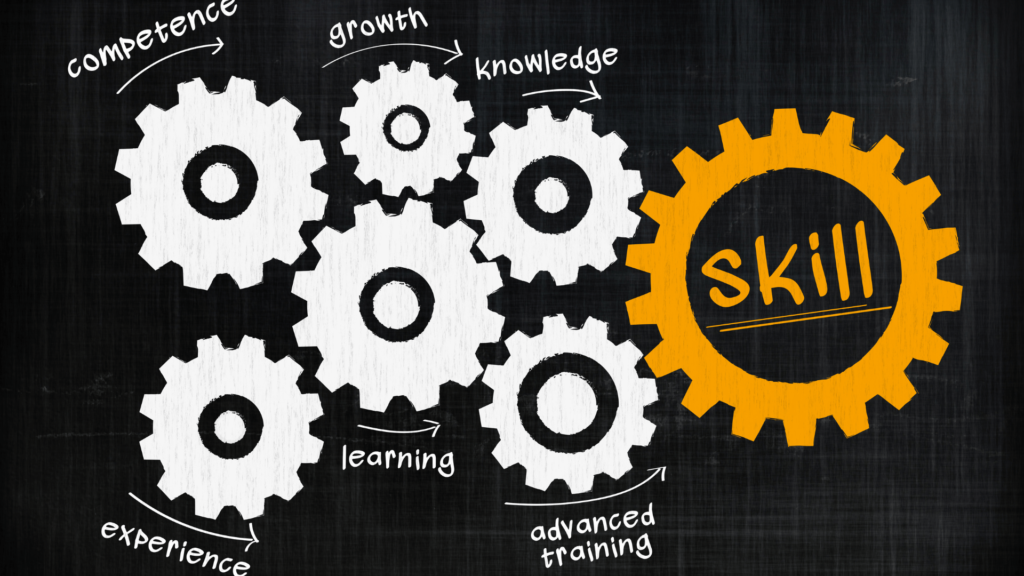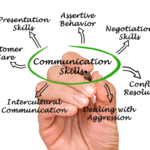Mastering Interpersonal Skills: Unlocking the Key to Successful Communication

What are Interpersonal Skills?
Navigating social situations, working with others, and grasping diverse perspectives are all skills that can be improved with practice. Having the ability to effectively communicate, interact, and build relationships is a key factor in achieving personal and professional success.
Interpersonal skills involve both verbal and nonverbal forms of expression, such as active listening, understanding, empathy, leadership, and team collaboration.
Mastering these skills can open the door to successful communication and meaningful connections with others.
In today's interconnected world, strong interpersonal skills are essential. They enable individuals to articulate their thoughts, feelings, and ideas in a clear and meaningful way. Through effective communication, one can foster understanding, trust, and respect, resulting in more productive and harmonious interactions.
Whether in personal relationships or professional settings, having strong interpersonal skills is crucial to overall success and fulfillment.
Interpersonal skills don't just mean verbal communication. Nonverbal cues, such as body language, facial expressions, and tone of voice, can also convey emotions, intentions, and attitudes. Developing these skills takes self-awareness, practice, and an openness to learning from experiences.
Through honing these skills, one can become a more proficient communicator, a better collaborator, and an influential leader in both personal and professional contexts.
The Benefits and Importance of Interpersonal Skills
The importance of our personal and professional lives cannot be stressed enough when it comes to cultivating advantageous interpersonal relations. Firstly, having robust interpersonal capabilities allows us to cultivate and sustain meaningful relationships with others.
An integral part of these abilities is the power of effective communication, which enables us to express our thoughts, ideas, and emotions clearly and poignantly.
By encouraging open and honest dialogue, we create a climate of trust and comprehension, which leads to better bonds and collaborations. In addition, these skills are essential for successful teamwork.
When individuals can cooperate and collaborate harmoniously, the team can accomplish shared objectives more productively. This results in improved performance and overall victory.
Therefore, refining and honing interpersonal skills is essential for individual growth and professional advancement.
Moreover, interpersonal capabilities significantly influence effective leadership. A leader with strong interpersonal skills can invigorate and stimulate their team members, creating a productive and positive work environment.
By attentively listening to their team, demonstrating empathy, and furnishing constructive feedback, leaders can clearly articulate their vision and objectives.
This not only advances team performance but also cultivates a culture of trust and deference. Astute leaders understand the value of interpersonal skills in constructing solid relationships with their team, stakeholders, and customers.
By fostering these connections, leaders can persuasively sway and influence others, resulting in positive outcomes.
Aside from personal and professional connections, interpersonal skills also have an impact on our overall well-being. When we possess sound interpersonal skills, we can manage conflicts and settle issues proficiently.
This reduces strain and promotes a healthier mental state. Furthermore, strong communication skills allow us to articulate our requirements and limits while comprehending and respecting those of others.
This leads to healthier and more satisfying relations, both in our personal and professional lives. The ability to create and maintain positive ties with others is a fundamental element of human interaction and greatly contributes to our total contentment and gratification in life.
In conclusion, the benefits and significance of interpersonal skills are broad and multifarious. These abilities enable effective communication, teamwork, leadership, and conflict resolution, resulting in stronger ties and greater success.
Developing and improving interpersonal skills not only boosts our personal growth but also has a positive effect on our professional achievements. By unlocking the secrets to successful communication, we can unlock a realm of possibilities and form meaningful
Developing Interpersonal Skills
Strengthening one's ability to effectively interact with others is a crucial element for successful relationships and meaningful dialogue. This involves honing the aptitude to actively listen, express thoughts clearly and respectfully, and be open to different perspectives.
It also means cultivating empathy and understanding, as well as being agile and flexible in communication styles.
With continual learning and practice, individuals can refine their interpersonal abilities and unlock the trick to successful communication.
A great way to bolster these skills is by actively seeking out opportunities to engage with others, such as team projects, social activities, or networking events.
By placing oneself in situations that necessitate collaboration, one can practice and sharpen communication skills.
This can include joining group conversations, giving constructive criticism, and taking on leadership roles. Furthermore, soliciting feedback from others and being open to improvement can help identify areas for improvement and further bolster interpersonal abilities.
Self-awareness is also essential for improving interpersonal skills. Understanding one's own communication style, strengths, and areas for growth is fundamental to creating effective connections with others.
By reflecting on past experiences and interactions, individuals can gain insight into their communication patterns and determine areas where they can enhance. This self-knowledge can also help individuals recognize any biases or preconceptions they may have, allowing them to approach conversations and relationships with a more open and impartial attitude.
Lastly, continuing to learn and grow is an important factor in developing interpersonal skills. Seeking resources such as books, courses, or workshops that focus on communication and interpersonal skills development is a great place to start.
Engaging in self-study and utilizing new techniques and strategies can help refine skills and stay informed with best practices in effective communication.
Additionally, seeking out mentors or role models who excel in interpersonal abilities can provide valuable guidance and enthuse further development. By dedicating time to ongoing learning and improvement, individuals can constantly upgrade their interpersonal skills and unlock their maximum potential in successful communication.
Examples of Interpersonal Skills in Action
Working together with others to achieve a common goal is a prime example of interpersonal expertise in action. Collaborating and actively listening to what others have to say, as well as being able to share ideas and constructively resolve conflict, are all essential elements for successful teamwork.
Likewise, successful leadership requires strong communication abilities which enable one to express their vision clearly and engage others in the process.
Empathy is also a key interpersonal trait, allowing individuals to comprehend and relate to the emotions and experiences of others, thus constructing stronger connections and trust. These examples demonstrate the significance of interpersonal skills in the development of positive relationships and attaining success in diverse areas of life.
Interpersonal skills also play an important role in everyday interactions. For instance, effective communication is fundamental in resolving conflicts and sustaining healthy relationships. Through active listening and expressing one's thoughts clearly, one can avoid confusion and foster greater understanding with others.
Similarly, negotiation involves using effective communication and influence tactics to arrive at mutually beneficial solutions.
By recognizing others' needs and points of view, it is possible to reach agreements that are agreeable to all parties involved.
These examples show how interpersonal skills can lead to successful outcomes in a variety of professional and personal scenarios, emphasizing the importance of honing and developing these skills.
How to Improve Interpersonal Communication
The key to enhancing our personal and professional relationships is developing effective communication techniques. To achieve this, we must be proficient in active listening, adapting our communication style, understanding and sharing the feelings of others, and being mindful of our body language and nonverbal cues.
Active listening involves engaging with the speaker, being attentive to both verbal and nonverbal signals, and providing feedback to show comprehension. Additionally, recognizing our communication fashion and adjusting it to suit different scenarios can help us make more meaningful connections.
By honing these active listening abilities and adjusting our communication approach, we can strengthen our interpersonal relationships.
Furthermore, cultivating empathy is essential for effective communication. Empathy entails grasping and sympathizing with the sentiments of others. By seeing things from their point of view, we can acquire a greater understanding of their perspective and respond in a more sympathetic and supportive way.
This not only assists in constructing stronger relationships but also promotes trust and admiration. To fully practice empathy, it is necessary to engage in active listening and show genuine interest in the experiences of others, enabling us to establish deeper connections and strengthen our interpersonal communication.
Additionally, being aware of our nonverbal cues and ensuring they align with our verbal communication is also crucial for improving our interpersonal communication. Nonverbal messages such as facial expressions, gestures, and posture can convey a wealth of information and heavily influence how our messages are received.
By focusing on these aspects of communication, we can enhance our ability to connect with others and create meaningful interactions.
Mastering Interpersonal Skills Program Overview
The Mastering Interpersonal Skills Program Overview provides an extensive training program to provide individuals with the necessary soft skills required to excel in personal and professional relationships.
This program delves into the key elements of effective dialogue, providing participants with the ability to achieve their communication goals with success. With a combination of theoretical knowledge and practical exercises, participants will acquire a comprehensive understanding of interpersonal communication and learn techniques to bolster their skill set.
The program accentuates the significance of attentive listening, sympathy, and proficient verbal and nonverbal interaction in forming strong connections with those around them.
With the mastery of these interpersonal skills, individuals can unlock the enigma of successful communication and cultivate meaningful bonds in all aspects of life.
The Mastering Interpersonal Skills Program Overview supplies a systematic framework for individuals to upgrade their interpersonal skills and revolutionize their communication proficiencies. Participants will learn how to maneuver obstructions to effective communication and form strategies to conquer them.
The program supplies individuals with the methods to communicate firmly, resolve disputes, and create trust in their dealings with others.
By mastering these interpersonal skills, participants can anticipate seeing improvements in their personal and professional relationships, resulting in improved collaboration, management, and overall success.
Whether you are a seasoned professional looking to grow your communication skills or an individual seeking personal development, the Mastering Interpersonal Skills Program Overview provides a valuable opportunity to unleash your potential and excel in today's interconnected world.
Understanding Interpersonal Communication
Developing an understanding of effective communication is essential for forming robust relationships. It allows you to bridge gaps with others and create trust. By recognizing the nuances of verbal and nonverbal communication, you can convey your thoughts and ideas.
Additionally, mastering the art of conversation enables you to comprehend the feelings and needs of others, allowing you to react empathetically and create meaningful connections.
Ultimately, gaining insight into the fundamentals of communication is the key to strengthening your interpersonal abilities and ultimately unlocking the secret to successful conversations.
Having a strong foundation in the art of communication is critical for honing your interpersonal skills. It gives you the ability to share your thoughts and emotions in a way that is understood and appreciated.
Additionally, it helps you to circumvent potential communication barriers, such as cultural differences or misunderstandings.
By understanding the intricacies of communication, you can foster positive relationships and foster a sense of understanding. In conclusion, understanding the power of interpersonal communication is the key to improving your communication skills and creating successful relationships.
So let's continue to hone our communication skills and watch as our relationships flourish.
Leave a Reply




Related Posts